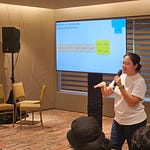Hello friends!
Today I’m writing from Kuala Lumpur, Malaysia. I have found myself discovering many interesting people and communities around Asia and I will keep sharing my observations. The audio version above is a short summary of the text below, in addition to unpacking some of the events with Colin.
Enjoy and have a nice day!
Time stamps of our conversation:
[00:04:44] - Why did web3 as an ideology transform into a tech-focused casino
[00:17:06] - A positive shift in interest around our values
[00:23:03] - Our next steps - creating spaces to introduce people to autonomy
[00:29:29] - Design-focused hackathon/accelerator concept
[00:32:04] - Design decisions behind Deep Teams and where we can take it
Recent internal updates
I'm excited to share a few great updates from the team:
Savannah, Sarah, and I have been working on a pitch deck project and Savannah made a first draft of her workflow (currently only accessible to Deep Work experts).
Stacy and I created a first draft for a standalone Generative User Research process. We are planning to kick it off with a workshop for a client soon.
Balint and I started jamming on a hackathon concept. There seems to be a lot of interest among designers, sponsors, founders, and others to help teams build more user-focused applications. We have experimented with something similar four years ago. Ping me if you’d like to be involved!
Granite is live! Thank you to the Orange Domains team and Laura, Justina, Vitalii, Ola, Boyana, Hazem, Bence and Colin!
Increased interest in web3, healthy communities, and user-focused products
Since I arrived in Asia in early August, I have noticed increasing awareness and deep interest in user-facing applications and organizations with a core focus on collective well-being. Generally, people I have met recently* respond enthusiastically to the potential of aligning different interests on a common goal, creating products that solve real-world problems, and building healthy communities.
I’m still trying to make sense of the conversations because they differ significantly from what I know from conferences or IRL events in the past.
*For context, I spoke with various participants, sponsors and speakers at the EthTokyo and WebX conferences, the founder of an accelerator, three VCs, a developer studio, a lawyer, a new founder, and a founder and employee of two well-known projects.
More evidence for decreasing quality of work in companies
I had conversations with two design/growth agencies, read the internal documents of one, heard about the internal processes of another, and had various conversations with prospects reaching out for work. Here’s a list of a few challenges that seem to affect the quality of work:
Paperwork and bureaucracy
In order to establish a formal partnership with Deep Work (forwarding or collaborating on projects), one agency relied on multiple legal documents I need to sign. I haven't received them yet, but I'm not sure of the purpose.
The cost and time can be dramatically reduced by building businesses on social contracts instead. Smartinvoice, Legra.app or Gnosis Safe are examples of software that facilitates conversations and social contracts without the need for traditional legal infrastructure.
Convoluted processes
The internal processes of a well-known growth agency explain a wide range of market research tasks as part of a very long, but standard client process. I have listened to a panel with the founder of this agency but her comments were inconsistent with what their processes should reveal about the current market.
Long processes take more time to improve, compared to shorter and more modular projects.
Business model: burnout
I keep hearing from friends who face stressful work environments and burnout at agencies or workplaces. Some founders set unrealistic expectations, change deadlines, or ignore appropriate onboarding of new employees.
The best companies create an environment that supports employees’ well-being and facilitates bringing out the best in each other.
Misinterpretation of business challenges
I have also started pushing back harder on founders who want "a new website" or "branding" without a business model or user research. Three founders I spoke to aimed to create a website to attract users to a non-existing product, platform or token, with no clear understanding of the value proposition or sometimes even audience.
Social media elevates success stories and only shows results, but rarely puts them in context to the work it took to achieve that result. For example, a great restaurant might make it seem effortless to create a unique dish fast and create the illusion that it’s easy to reproduce. The main work in the kitchen however is invisible.
Gathering feedback on Deep Teams
Given the increased interest in our work, I started showing Deep Teams to founders, managers, and anyone else who understands the importance of structure in human coordination. So far the feedback has been very positive and one ex-Google employee mentioned that there is a very similar platform in use internally at Google, called "Moma". He also recommended testing the use case of "finding and hiring skilled freelancers".
I am currently user-testing the value proposition with a guide for hiring freelancers from Deep Work.
Our “Adoption hub“ for Devcon got accepted!
Together with a group of friends and super-talented people from the industry, we are planning to host a hub (a room for a few days) on the topic of adoption in web3, with workshops on user research, design, marketing, branding, business, and more.
Please have a look at this proposal or leave some feedback if you have ideas: https://forum.devcon.org/t/sea-community-hub-proposal-adoption-hub/3757
Any comments would be highly appreciated as they will help us make the best of it.
Recommended reading
Who can change the world today? by Michel Bauwens
A look at how social classes and cultures seem to transform from a historical and political perspective.
Ergodicity by Luca Dellanna
The author breaks down tangible applications of the mathematical concept underlying irreversible risk scenarios vs. decisions that lead to long-term survival.
Thank you for the kind feedback on the newsletter. I am currently in a strange place between frequent travel, solitude, many conversations with strangers, and recovering from an injury. It’s challenging to stay focused, but reading your comments motivates me to keep going.
Thank you. Much love,
Andrej












